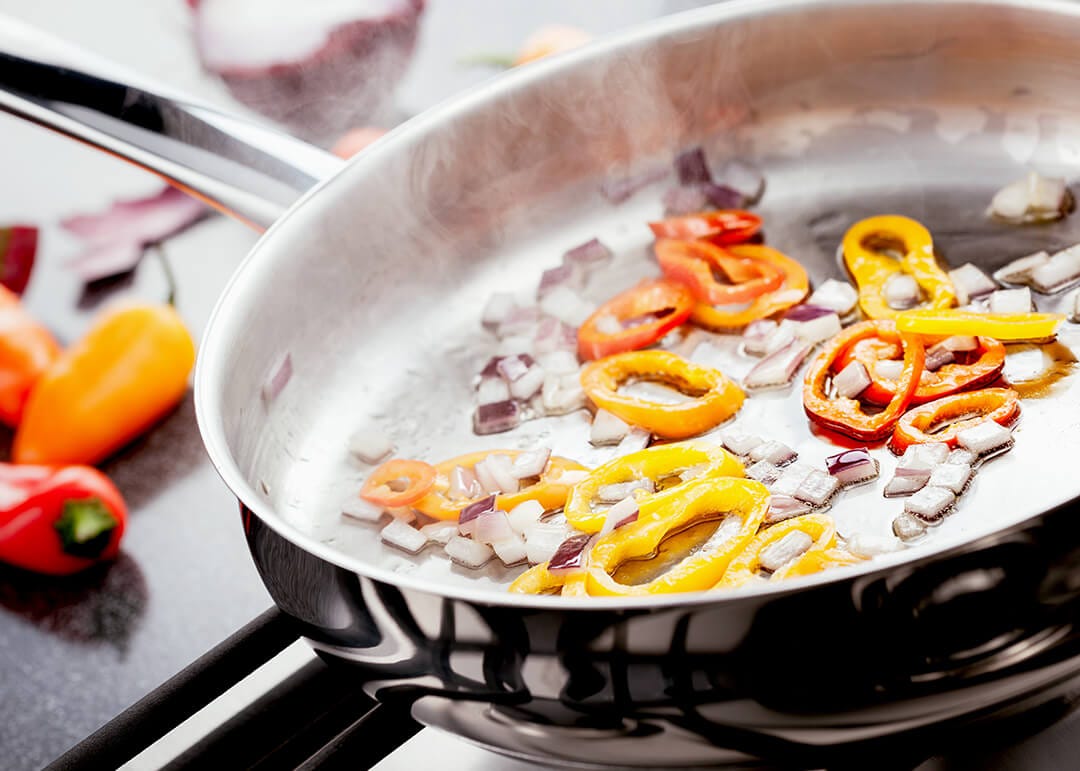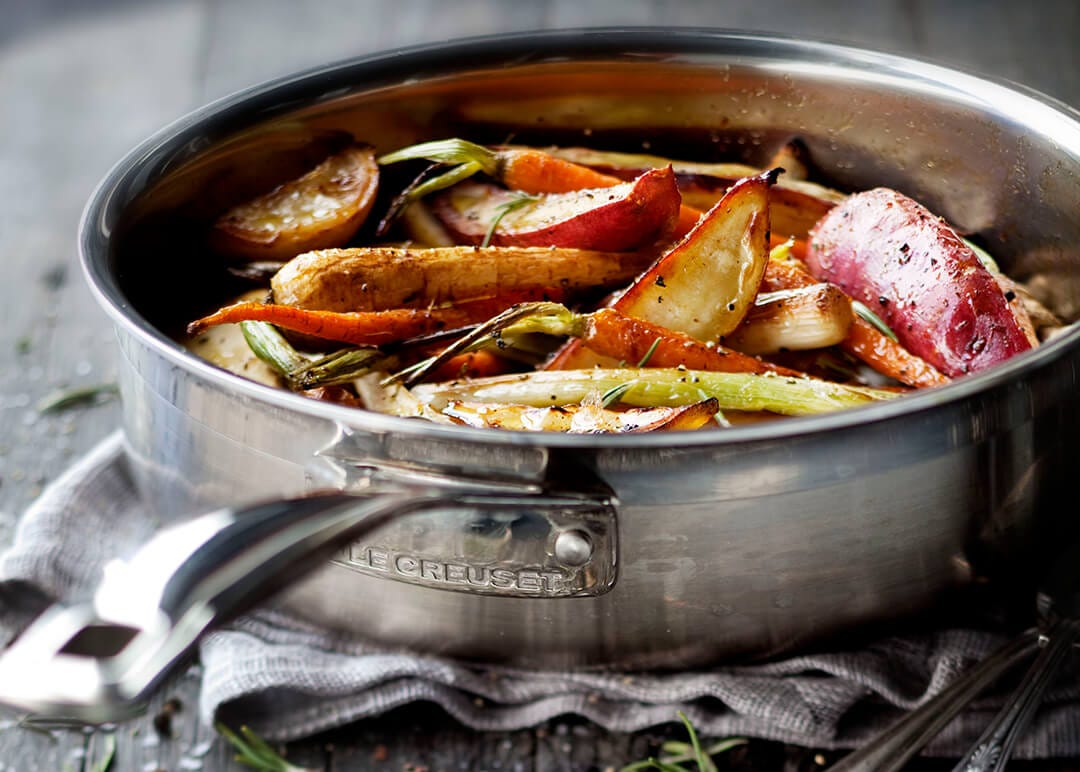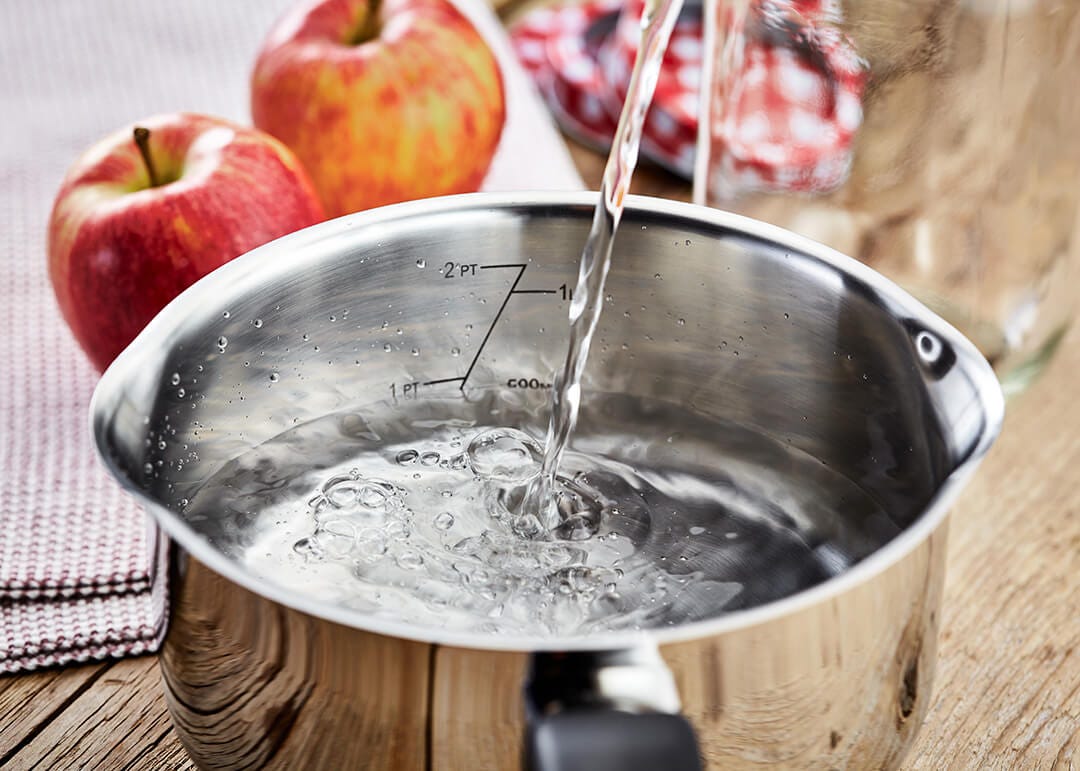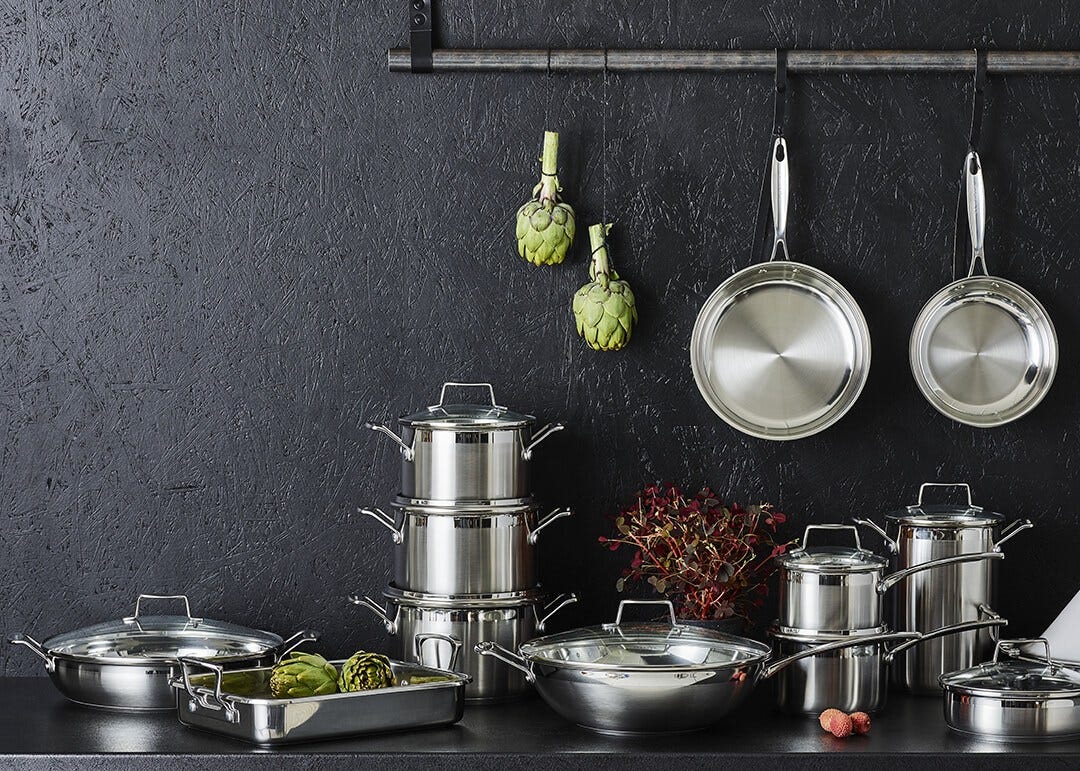How to get the best from your stainless steel cookware
Categories:

Stainless steel is one of the most popular materials used for cookware and for good reason. It is strong, durable, resistant to rust and looks great with its polished or brushed finish. The best stainless steel for cookware is 18/10 (the steel includes 18% chromium and 10% nickel). This offers the optimum balance of performance, shine and durability. 18/8 stainless steel is also frequently used and although perfectly serviceable, has a slightly lower nickel content. Although not a great conductor of heat (that’s why stainless steel cookware usually features an aluminium core), it reacts quickly to temperature change, providing greater control during cooking. I’m the proud owner of a set of Stellar 1000 saucepans that were purchased pre millennium, using them nearly every day. They may have picked up a few marks and dinks over the years but they are generally in as good a condition as the day they were purchased. Below are some top tips to get the best from your stainless steel cookware.
POPULAR STELLAR 1000 STAINLESS STEEL COOKWARE
In the heat of the moment
We’ve all seen chefs on TV with flames licking up the sides of their pans. It may look theatrical but it doesn’t do the pan any good. Firstly always try and match the size of your pan to the hob ring - you are aiming to heat the base of your pan, not the sides. If you are searing or sauteing meat in a frying pan by all means heat the pan over a medium heat for a couple of minutes, adding the cooking fat when the pan is nice and hot. But don’t let it sit empty on the hob for too long. I tend to add the cooking oil at the beginning of this process, but there is the train of thought that the longer oil spends in contact with a hot surface the more it gets broken down which can cause sticking. Excessive heat can also cause discoloration to the surface of the pan and in extreme cases warping or buckling. To check if the pan and oil has reached the correct cooking temperature add a drop of water or a small amount of food to the pan. If you hear a healthy sizzle you are good to go!
Sticky issue
Avoid using cooking sprays. Yes, they may save you a few calories but as well as containing oil they also contain propellants, anti-foaming agents and emulsifiers, the latter in particular is prone to turning into a gummy, sticky residue which is difficult to remove from the pan. A much better alternative (for the pan at least) is to use oil or butter.

POPULAR LE CREUSET 3-PLY STAINLESS STEEL
Pit stop
When seasoning cooking water for pasta or vegetables add the salt after the water has come to the boil. This way the salt dissolves straight away and won’t sink to the bottom of the pan as it does when added to cold water. Salt can cause a breakdown of the pan's chromium oxide layer known as pitting (little white dots on the surface of the pan). Over time this can be detrimental to the pan’s performance. I must admit to adding salt at the same time as the water, but fortunately my pans are showing no signs of pitting.
Too hot to handle
Occasionally we receive correspondence from customers complaining that their pans’ handles and lids are getting excessively hot, even on products with ‘stay cool’ handles. Firstly care should always be taken when handling anything hot. Always use oven gloves when lifting lids or moving pans to and from the hob, oven or grill. Handles and lids will naturally warm up through heat conduction via the pan and its contents. But if the heat is set too high or you are using a hob ring that is bigger than the base of the pan, the handle will be heated directly from the excess heat rising up around the pan (this is especially common with gas hobs). Stay cool handles are usually hollow in design allowing heat to dissipate quicker than if they were solid. They can cope perfectly well with heat conduction but will struggle to cope with excessive direct heat, so just use a bit of common sense.

POPULAR JUDGE VISTA STAINLESS STEEL COOKWARE
Over the rainbow
Another common area of concern is the rainbow staining that can suddenly appear on stainless steel cookware. People often associate this as a defect in the pan or the result of using substandard materials, but this isn’t the case. Also known as ‘heat tint’ this rainbow effect is purely aesthetic and has absolutely no impact on the pans performance. As mentioned above, stainless steel contains a small amount of chromium which helps to resist rusting and corrosion. When the chromium comes into contact with air it creates a protective layer on the surface of the pan. If the pan is then heated to a high temperature, this oxidised layer thickens which can cause the rainbow patterning. I find this happens more when boiling pasta but tend not to bother doing anything about it. My youngest daughter who has a particular fixation with rainbows calls it the ‘magic pan’ and absolutely loves it when this happens. These stains normally disappear naturally after a few washes, but if you aren’t into rainbows in the same way it is really easy to remove. You can readily purchase a proprietary stainless steel cleaner which will do the job, but a cheaper and just as effective option is to pour a little diluted white vinegar into the pan and give it a wipe around with a sponge. Give the pan a quick rinse and dry thoroughly and you should be left with a shiny, stain free saucepan! A mixture of bicarbonate of soda and lemon juice is another excellent alternative that you can try.
Keep it clean
There are a few dos and don’ts when it comes to cleaning stainless steel pans.
Don’t use abrasive cleaning products or scouring pads as this will damage the surface of the pan. If food has burned onto the surface of the pan try using some baking soda. Fill the pan with water, covering the burnt food. Pour in 55gr of baking soda, give it a good stir and bring the mixture up to a boil. Allow the mixture to cool for around 45 minutes then give the pan a gentle scrub. You may need to repeat the process depending on how stubborn the burnt on food is.
It is recommended that you hand wash stainless steel cookware as the harsh detergents used in dishwasher tablets can degrade the finish and performance of the cookware over time. I haven’t found this to be the case with my Stellar 1000s. Having spent the first 13 years of their life being hand washed, they have spent the following 8 years being regularly chucked into the dishwasher and in my mind are all the better for it, coming out gleaming and sparkling, almost like new.
If you have any tips on keeping your stainless steel cookware in tip top condition we’d love to hear from you.

POPULAR SCANPAN IMPACT STAINLESS STEEL COOKWARE
Try our easy to use Cookware Finder and discover the perfect cookware for you!















